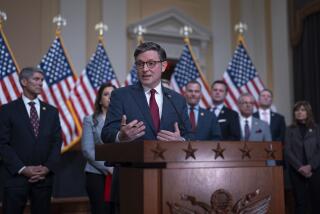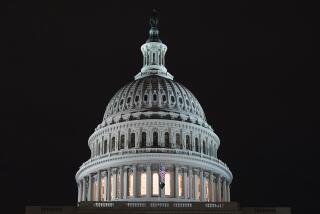Passage of debt-ceiling deal won’t curb consequences
Even as the Senate began debate Tuesday morning on the debt-ceiling compromise, expected to easily pass by midday, the economic and political fallout of the weeks of partisan bickering are expected to continue for months.
“Finally, Washington is taking responsibility for spending money it doesn’t have,” said Sen. Lamar Alexander ( R-Tenn.), kicking off the Senate debate on the measure that contains something that almost everyone dislikes. Conservatives are unhappy about the relatively small spending cuts while liberals are unhappy that it does not contain anyone new revenue or add taxes on the rich.
As senators debated the bill, which passed the House on Monday, the White House announced that President Obama will make a statement shortly after the vote. Obama must sign the bill Tuesday or the United States could face default.
The agreement will raise the $14.3-trillion debt ceiling by $2.1 trillion and includes $917 billion in spending cuts over 10 years with an additional $1.2 trillion in cuts to come later in the year from a select committee of members of Congress.
The debt-ceiling debate and its related economic issues are expected to be the cornerstone of the rest of 2012 presidential election cycle. But there are economic consequences as well.
Raising the debt ceiling is designed to prevent a national default, but Treasury Secretary Timothy F. Geithner warned that the compromise may not be enough to prevent the United States’ credit rating from being downgraded. The rating agencies have cautioned that such a downgrade, which would increase interest costs for consumers as well as the national and state governments, remains a possibility.
In an interview with ABC News aired Tuesday, Geithner was cautious about how the rating firms will react.
“You know, they’re going to take a careful look,” Geithner said in a transcript posted on the Web. “What rating agencies do is they look at two things. They look at the basic, underlying growth prospects of an economy, and they look at the capacity of a political system to make tough choices to live within their means.”
Geithner said the compromise sets up a mechanism through the special congressional committee that might allow the nation to manage its debt and spending woes in a better fashion. But the final action by ratings agencies was still up in the air.
“It’s not my judgment to make, and if they have to make that judgment,” Geithner said. “This is in some ways, a judgment on the capacity of Congress to act. And what this deal does is put us in a much better position to make those tough choices because the down payment’s pretty strong and this special committee, this mechanism for the reforms is a much more powerful device than we’ve had in the past.”
Geithner also sidestepped questions about whether he will leave the Cabinet after the deficit reduction deal is approved.
“I mean, I haven’t made that decision yet,” he said. “And you know, we’ve got a lot of challenges, the president’s got a lot of challenges, and you know, I’ve got other pressures on me too. But I’ll make that decision at the right moment.”
More to Read
Get the L.A. Times Politics newsletter
Deeply reported insights into legislation, politics and policy from Sacramento, Washington and beyond. In your inbox three times per week.
You may occasionally receive promotional content from the Los Angeles Times.











